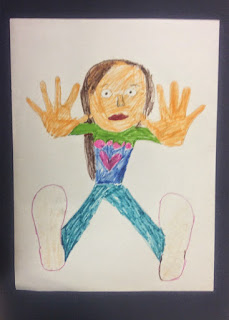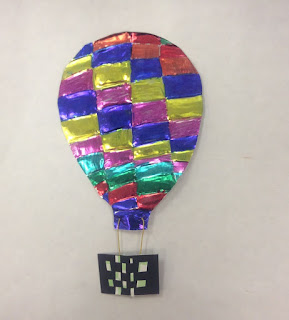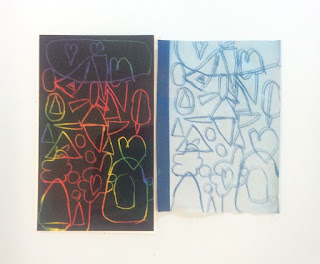
Saturday, May 30, 2015
Sun Prints with student created stencils
When the weather cooperates, sun prints are part of the end of the year curriculum. Some years the weather just doesn't cooperated but this year has been generous with really warm sunny days up here in the Northeast. I think I saw the idea to use the stain glass scratch art paper to make a stencil on pinterest. I tucked the idea away knowing it would work great for this year's sun prints. I challenged 2nd grade students to draw geometric and organic shapes in an interesting way on the scratch art paper. They could overlap or texture the shapes in any way they wanted. We headed outside into the sunshine ready to print once these were ready. I wish my sun print paper had been a bit larger so the prints wouldn't have been cut off, but they came out pretty good. This project has me thankful for this springs warm sunny days!


Fifth graders Illustrated Children's Books
My fifth grade students have spent most of the year writing and illustrating children's books to be shared with younger students in their school. As the year draws to a close many of those books are being completed. I have scanned all of their work into Photo Shop where words were added. Then all the books were spiral bound for the students to present. I was looking for a way to animate the work and was unsuccessful with all attempts to take the psd images into any free animation programs. Finally, I turned to Movie Maker and have create this video to share with you of one of the books. Please forgive the misspellings and occasional mistakes, I thought I was a better proof reader but some mistakes did slip by me.
Architecture in 3D
My second grade students recently spent sometime observing the homes outside the windows in the art room. They were evaluating the way windows were placed on the homes and the exterior finish of the buildings. They also examined the roofing choices made by the home owners. Using a terrific little house template I had discovered a few years ago on pinterest, they then created their own homes with a focus on the architectural elements. Some students explored creating the illusion of siding while others attempted creating brick. All students experimented with adding shingles on the roofs. The above photo shows one classes completed "village". I wish we'd had more time to maybe create a collaborative community with other elements but the weeks are quickly slipping by so that was out of the question. Mental reminder for next year, start these a week or two earlier. Below are a few individual houses. I chuckled as I realized a few students had grabbed their scissors after these were completed and cut slits so they could open their doors. Clever 2nd graders aren't they?!

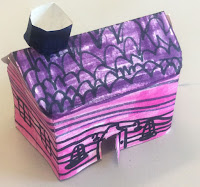

Tuesday, May 26, 2015
Love these self portraits
My project of focus to show growth for this year was self portraits. My goal was to have students draw three self portraits over the course of the year. To keep it fun, students approached each portrait with a different theme. In the fall, the focus was on teaching students to draw a self portrait emphasizing the placement and size of features as a teacher led activity.. A quick verbal review and demonstration proceeded the winter draw where students were to dress their portraits for the cold winter weather. For the final portrait, 2nd grade students imagined themselves jumping on a trampoline or in a pike jump from gymnastics. They began by tracing their hands and feet and then completed the work by adding the clothes and their own faces. A verbal reminder was all that was given in terms of instructions for laying out the face. I really do love how these turned out!
 |
| portrait one (fall) |
 |
| portrait two (winter) |
 |
| final portrait all same child |
Good days as the year winds down
Here we are in the final month of school and I have to say, today's classes were fabulous! I began one-point perspective with fourth graders. I love introducing students to this process. They become genuinely excited and really quiet as they concentrate on making their shapes disappear to the vanishing point. I started the lesson by having all the students join me at the front of the room to view the ceiling tiles. Then I ask them to share what they were noticing. I had some great answers mentioning shapes, "they are rectangles", patterns "the tiles make a repeating pattern" and then finally "they look smaller and they are closer to the other end of the room" . Bingo! Just the answer I was hoping to achieve. Students returned to their seats where they practiced holding their rulers to successfully create diagonal, vertical and horizontal lines. I've learned in past years that the skill of holding the ruler and drawing a straight line is not being taught anywhere but in the art room and began to incorporate the skill building at the beginning of this project. Students then draw five simple geometric shapes using their rulers to ensure nice straight lines. They add a vanishing point and work around the paper, beginning with the shapes closest to the point to put all of the shapes into perspective. To build the excitement, I tell them we will be writing their names in block letters in a following class and they will follow the same process. This is a terrific way to end the school year on a big high. I'll post work as soon as some are finished.
 |
| worksheet from pinterest that was used as a practice tool prior to personal projects |
In second grade, we took advantage of the warm sunny day to create some sun prints. I had seen on a blog or pinterest, an idea of using the stain glass scratch art paper to make a stencil for sun printing. 2nd graders reviewed shapes and filled the scratch art paper with a variety of geometric and organic shapes to fill the paper. I wrote each students name, in reverse, on the paper for them so that it would print correcting on the sun print paper. With five minutes left in class, we all headed outside to use the new stencils, a terrific piece of work by itself, to make a sun print. I plan to mount both pieces together for the completed work.


Kindergarten students are weaving bookmarks using rubber shelf liner and gimp. Last year's classes took a complete 4 weeks to complete these. I already have two talented little ones that have finished in just two weeks.
 |
| This years balloons in the works. |
 |
| Previous project, watch for an updated version when more are completed. |
Wednesday, May 13, 2015
My student is nominated for Artsonia Artist of the Week
I just received the news this morning that my student, Ryder714 has work being considered for Artist of the Week. Please, let's give him a win! Ryder is in Kindergarten. Here is the link for voting: http://www.artsonia.com/aotw/vote/0/38517470 You can vote every day! I'm keeping my fingers crossed for a win for Ryder.
Saturday, May 9, 2015
I love Children's Illustrated Books!
Saturday, May 2, 2015
Symmetry and Monarch Butterflies
 With the Fiesta dance just a few days away, first graders needed to create a decoration that also incorporated some of the elements and principals of art. Symmetry seemed to be a good focus along with color and color mixing to create these dynamic Monarch butterflies. Students began the lesson by review knowledge achieved in Science class when they learned about the life cycle of the Monarch and it's migration habits with winters in Mexico. The monarch seemed to be a good focus for a Fiesta decoration in that these butterflies spent a good portion of their life in Mexico as well as most parts of the U.S. Students used red and yellow paint to make a symmetrical print. Week two, sharpie markers were used to add detail and eyes. Pipe cleaners became the antenna for the butterflies. These will also double as eye catching decorations for the upcoming dance.
With the Fiesta dance just a few days away, first graders needed to create a decoration that also incorporated some of the elements and principals of art. Symmetry seemed to be a good focus along with color and color mixing to create these dynamic Monarch butterflies. Students began the lesson by review knowledge achieved in Science class when they learned about the life cycle of the Monarch and it's migration habits with winters in Mexico. The monarch seemed to be a good focus for a Fiesta decoration in that these butterflies spent a good portion of their life in Mexico as well as most parts of the U.S. Students used red and yellow paint to make a symmetrical print. Week two, sharpie markers were used to add detail and eyes. Pipe cleaners became the antenna for the butterflies. These will also double as eye catching decorations for the upcoming dance.Channeling Kandinsky
I will not take credit for this project idea, I found it on a fellow blogger's site Create Art with Me.

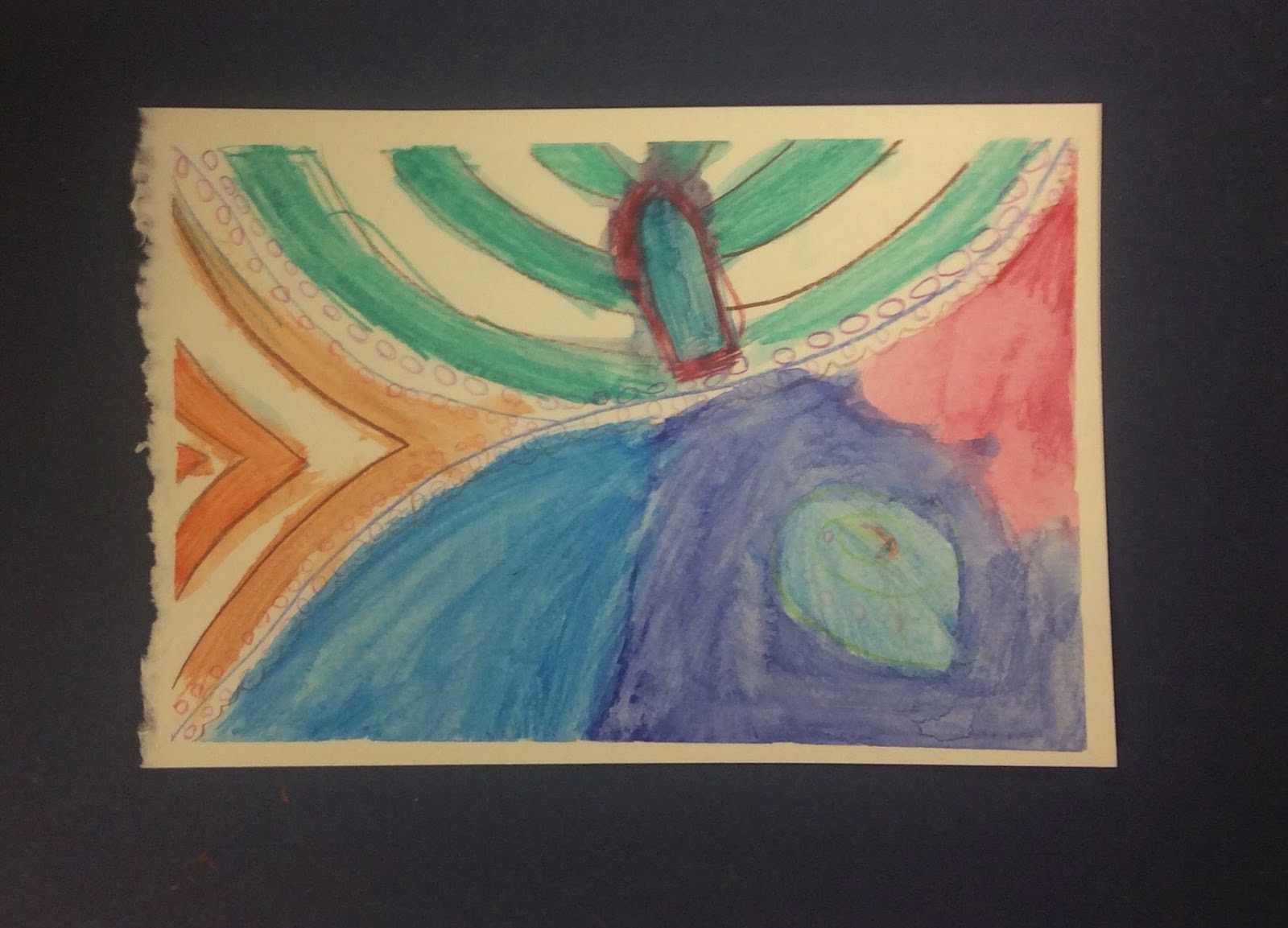 I had been exploring the work of Kandinsky with third graders when this lesson popped up on my blog feed. Students had practiced listening to the colors in classical movements and drawing with markers as the first process. I hadn't been sure I would be able to really achieve having them listening and creating successfully and had decided to test the waters, so to speak, with markers the first day. Week two, they progressed to watercolors as they listened to music and then I saw this post and knew a third lesson would need to be added to my plans. This lesson took a bit more direction and planning and more stop and starts. First I instructed students to only draw lines and shapes as they listened to the music using a basic color pencil. After about 4-5 minutes, the length of a musical selection, the pencils were put away and replaced with watercolor pencils. The instructions were to add color but not to color in the entire page. Students were reminded that this was not a coloring page and that in the third step we would be manipulating color and moving it so white space would be needed. Again the music played for a selection and then the watercolor pencils were traded for water and a small brush. Students were encourage to move the color thoughtfully and not to just add a water wash. I am really pleased with the variety of results obtained and can hardly wait until all the classes have finished so I can post these on the hallway bulletin board!
I had been exploring the work of Kandinsky with third graders when this lesson popped up on my blog feed. Students had practiced listening to the colors in classical movements and drawing with markers as the first process. I hadn't been sure I would be able to really achieve having them listening and creating successfully and had decided to test the waters, so to speak, with markers the first day. Week two, they progressed to watercolors as they listened to music and then I saw this post and knew a third lesson would need to be added to my plans. This lesson took a bit more direction and planning and more stop and starts. First I instructed students to only draw lines and shapes as they listened to the music using a basic color pencil. After about 4-5 minutes, the length of a musical selection, the pencils were put away and replaced with watercolor pencils. The instructions were to add color but not to color in the entire page. Students were reminded that this was not a coloring page and that in the third step we would be manipulating color and moving it so white space would be needed. Again the music played for a selection and then the watercolor pencils were traded for water and a small brush. Students were encourage to move the color thoughtfully and not to just add a water wash. I am really pleased with the variety of results obtained and can hardly wait until all the classes have finished so I can post these on the hallway bulletin board!
O'Keefe on a pyramid
 |
| photographed flat to capture the detail |
Lego Architect
Subscribe to:
Comments (Atom)






